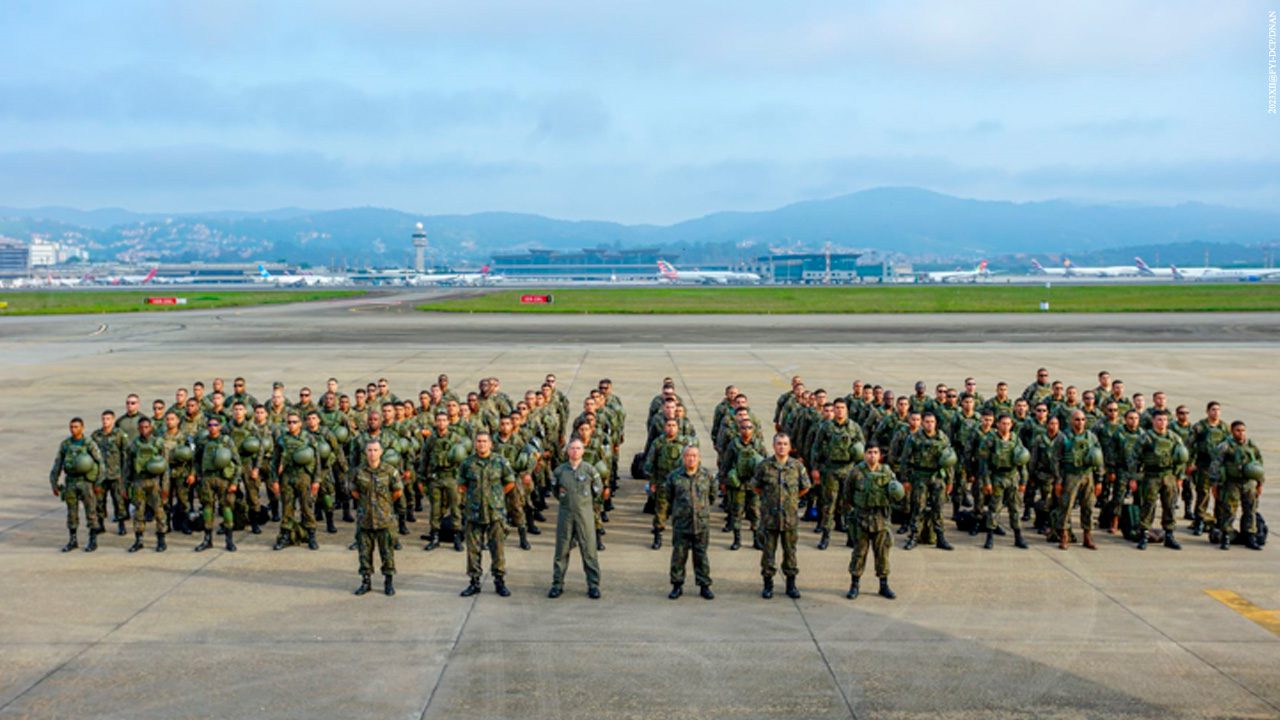Increased missions at Galeão and Guarulhos airports reflect synergy between airport authorities
Air Force Agency, by Lieutenant Marize Torres
Operation Air Bridge, which involves action by airport authorities to combat organized crime through the Guarantee of Law and Order (GLO), completed 30 days on Tuesday (05/12). The Brazilian Air Force (FAB), through Numbered Air Force 34 (FAN 34), an Operational Command subordinate to the Aerospace Operations Command (COMAE), announces the balance of the Operation launched after Decree No. 11,765 of November 1, 2023.
During the period, the preventive and repressive actions carried out at the international airports of Guarulhos, in São Paulo (SP), and Galeão, in Rio de Janeiro (RJ), have already accounted for more than 465 missions at both airports, with more than 163.6 kg of drugs seized. It is worth noting that, in addition to the numbers, the synergy and maturity consolidated between the airport authorities involved in the GLO, obtained from a relationship of trust built up over the course of the activities, denote the positive balance of Operation Air Bridge.
This is what the FAB commander of the operation, Air Brigadier Luiz Guilherme da Silva Magarão, points out. “We shouldn’t just focus on the figures presented. They are important because they represent the number of operations carried out, in other words, they show indicators of effort, which is valid for future planning and analysis. By increasing the number of actions, we are building a relationship of synergy and trust with the other agencies participating in the GLO, which are increasingly demanding our collaboration,” said the General Officer.

Data from Operation Air Bridge
In the first 30 days of the operation, 3,049 people and 1,118 vehicles were searched, in accordance with the protocol for approaching and searching the population in GLO operations, an activity that involves discretion and respect for the rights of employees and passengers. Patrol activities totaled 760 hours, while sniffing activities totaled 167 hours, reaching a volume of around 30,155 cubic meters, which is equivalent to approximately 17 fully loaded Boeing 747-400 aircraft.
In all, approximately 305 hours of inter-agency actions have been carried out, i.e. in collaboration with the Federal Police, the Federal Revenue Service, the Federal Highway Police, the National Health Surveillance Agency and the Military and Civil Police of both states. The activities involved action in the operational area of the airports, in the areas of baggage handling, inspection of suspicious cargo or passengers and employees, with the help of sniffer dogs, patrolling the perimeters of the airports with the use of vehicles and armed military personnel acting at sensitive points and also carrying out patrols in the lobbies.
Security
In the words of the Operation Commander, this type of action immediately increases society’s perception of security, since patrols are being carried out on a daily basis at airports. “The mere presence of a team of military personnel already has a very important effect and even changes people’s behavior,” said Major Brigadier Magarão.
At Galeão Airport, according to Rio Galeão Concessionaire Operations Director Dimas Salvia, since the GLO began, with the presence of the FAB in the lounges, passenger behavior has changed and he hasn’t had any problems with behavioral changes as he had experienced before the GLO.
For GRU Airport’s Director of Operations, Georges Chaoubah, the presence of the Air Force has been a differentiator, and the public has already noticed it in a positive way. “Passengers are already noticing this different movement and I think it gives them a feeling of greater security,” he said.

Synergy as a legacy
The relationship of trust built up between the airport authorities is an important positive balance that can also be considered a legacy of the operation. The Commander of FAN 34 emphasizes the importance of building this relationship. “Since the creation of the National Civil Aviation Agency (ANAC), the Brazilian Air Force has not been directly involved in airports. We only act at airports when there is a call for action such as this GLO, which has happened on other occasions. We were able to see that, over these first 30 days, synergy was built, resulting in a relationship of trust, which I think tends to extend after the GLO. So I think it’s a significant legacy that will remain from the operation,” he said.
Acting on the Border Strip
The Brazilian Air Force (FAB) has also played a crucial role in strengthening actions to prevent and repress crime along the border. In the last 30 days, the FAB has stepped up its operations, demonstrating a strong commitment to national security and border protection. This coordinated effort aims to maintain control of the airspace in order to curb illicit activities such as drug and arms trafficking, which often threaten Brazil’s sovereignty and security. Since November 6, the FAB has detected and identified, through its integrated systems, more than 802 flights on the border strip.
Through airspace control actions, the FAB has used its detection resources in synergy with cooperation activities with the Federal Police, in order to monitor and intercept potential threats entering Brazilian territory. These actions, which combine technology, intelligence and military experience, have been fundamental in guaranteeing the integrity of the national borders. The use of FAB fighter jets to visually identify aircraft has been a valuable resource in making this process redundant. The efficiency of the actions in compliance with Decree 11.765 reflects the high level of preparation and dedication of FAB professionals, who work tirelessly to guarantee the security of our country.

Photos: Petty Officer Johnson, Sergeant Néris and Sergeant Renata / CECOMSAER and Private Takashi / BASP *** Translated by DEFCONPress FYI Team ***
